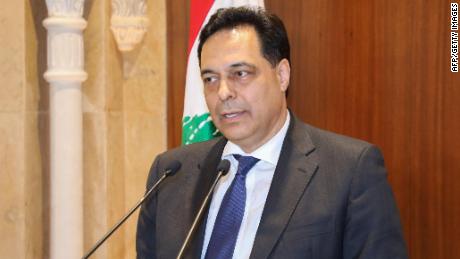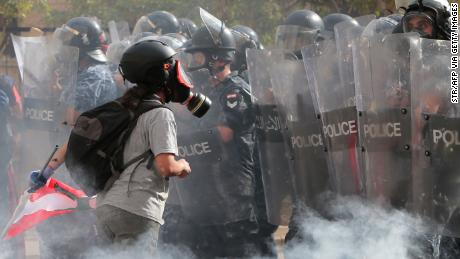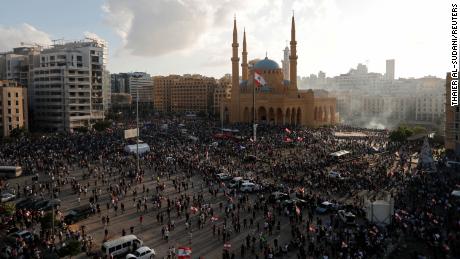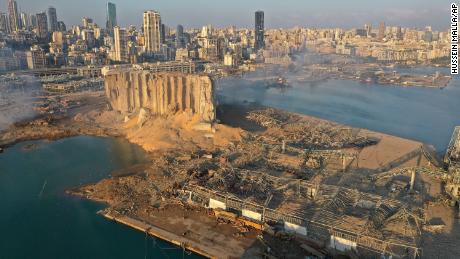Lebanon’s government steps down in wake of Beirut blast

Prime Minister Hassan Diab addressed the nation, announcing his resignation and that of his government in the wake of the blast, which he called a "disaster beyond measure."In an impassioned speech, Diab berated Lebanon's ruling political elite for fostering what he called "an apparatus of corruption bigger than the state." "We have fought valiantly and with dignity," he said, referring to members of his cabinet. "Between us and change is big powerful barrier." Diab compared Tuesday's explosion to an "earthquake that rocked the country" prompting his government to resign. "We have decided to stand with the people," he said. Three cabinet ministers had already quit, along with seven members of parliament.Violent protests erupted outside the prime minister's office in the run-up to the scheduled speech on Monday evening. Dozens of protesters hurled stones, fireworks and Molotov cocktails at security forces who responded with several rounds of tear gas. Some demonstrators tried to scale the blast walls outside Parliament Square.  Lebanon was already suffering through its worst economic crisis in decades, coupled with rising coronavirus rates, and the government has been plagued by accusations of corruption and gross mismanagement. Tuesday's blast, which damaged or destroyed much of the Lebanese capital and was linked to a long-neglected stash of potentially explosive chemicals, was the last straw for many Beirut residents.Diab, a self-styled reformer, was ushered into power last December, two months after a popular uprising brought down the previous government. His government is composed of technocrats and had been supported by major political parties, including the Iran-backed political and militant group Hezbollah.Now the country will be tasked with finding its third prime minister in less than a year, to contend with the spiraling crises Lebanon faces on a number of fronts.
Lebanon was already suffering through its worst economic crisis in decades, coupled with rising coronavirus rates, and the government has been plagued by accusations of corruption and gross mismanagement. Tuesday's blast, which damaged or destroyed much of the Lebanese capital and was linked to a long-neglected stash of potentially explosive chemicals, was the last straw for many Beirut residents.Diab, a self-styled reformer, was ushered into power last December, two months after a popular uprising brought down the previous government. His government is composed of technocrats and had been supported by major political parties, including the Iran-backed political and militant group Hezbollah.Now the country will be tasked with finding its third prime minister in less than a year, to contend with the spiraling crises Lebanon faces on a number of fronts.  Lebanon's currency has lost around 70% of its value since anti-government protests began last October. Poverty has soared, with the World Bank projecting that more than half of the country's population would become poor in 2020. The government had been seen as powerless in the face of a growing banking crisis. The state has not passed a capital controls law, exacerbating the country's severe liquidity crunch.
Lebanon's currency has lost around 70% of its value since anti-government protests began last October. Poverty has soared, with the World Bank projecting that more than half of the country's population would become poor in 2020. The government had been seen as powerless in the face of a growing banking crisis. The state has not passed a capital controls law, exacerbating the country's severe liquidity crunch.  The majority of people in the country have been subject to stringent and arbitrary cash withdrawal limits for nearly a year. Meanwhile, billions of US dollars are widely believed to have been withdrawn from Lebanon by the country's economic elite, further depleting foreign currency reserves.Lebanon's financial woes were exacerbated earlier this year by government-imposed lockdowns, designed to stop the spread of the corRead More – Source
The majority of people in the country have been subject to stringent and arbitrary cash withdrawal limits for nearly a year. Meanwhile, billions of US dollars are widely believed to have been withdrawn from Lebanon by the country's economic elite, further depleting foreign currency reserves.Lebanon's financial woes were exacerbated earlier this year by government-imposed lockdowns, designed to stop the spread of the corRead More – Source
[contf]
[contfnew]

cnn
[contfnewc]
[contfnewc]




